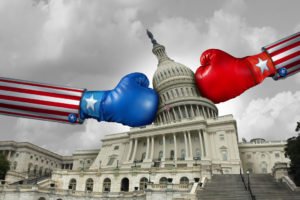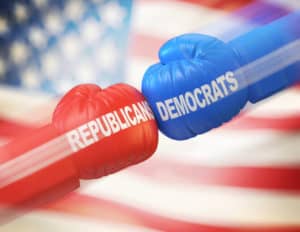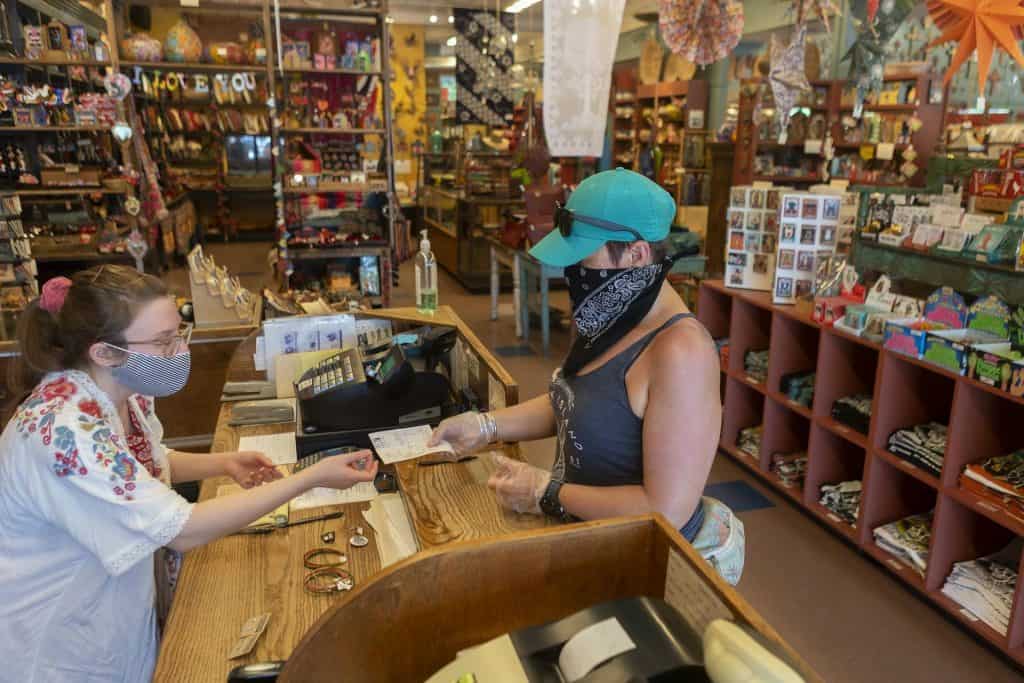
Brittney Kuepferle shops at Allens Boots in Austin on Tuesday. Many people are still too skittish about the virus to go out shopping. [Stephen Spillman/for Statesman] 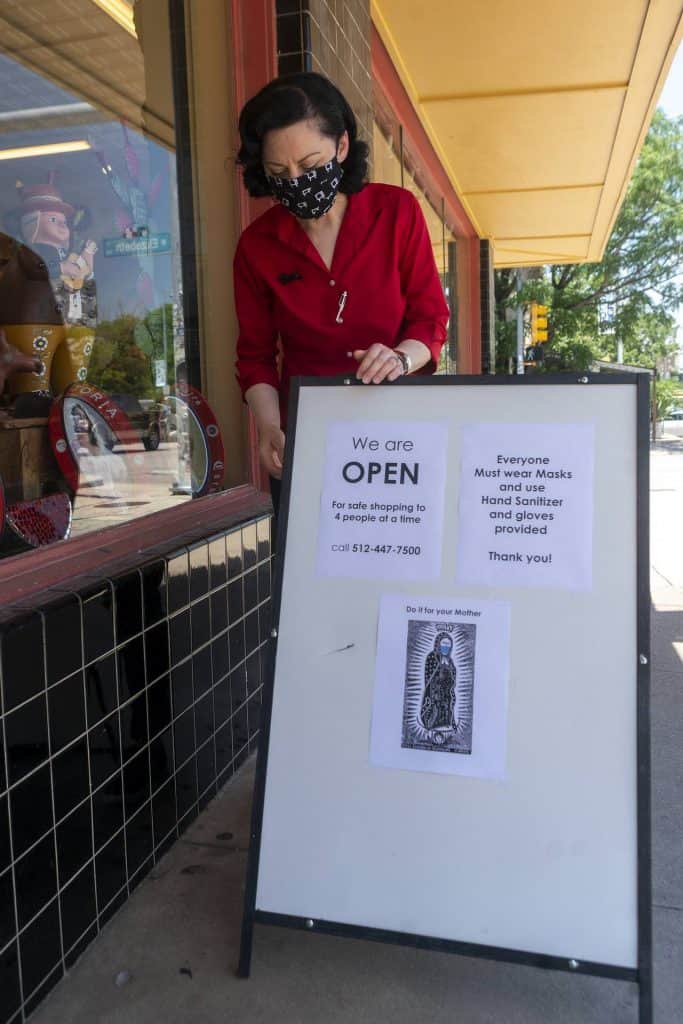
Store manager Julia Mulholland places a sign listing restrictions for customers outside the Tesoros Trading Co. store in Austin this week. [Stephen Spillman/for Statesman] 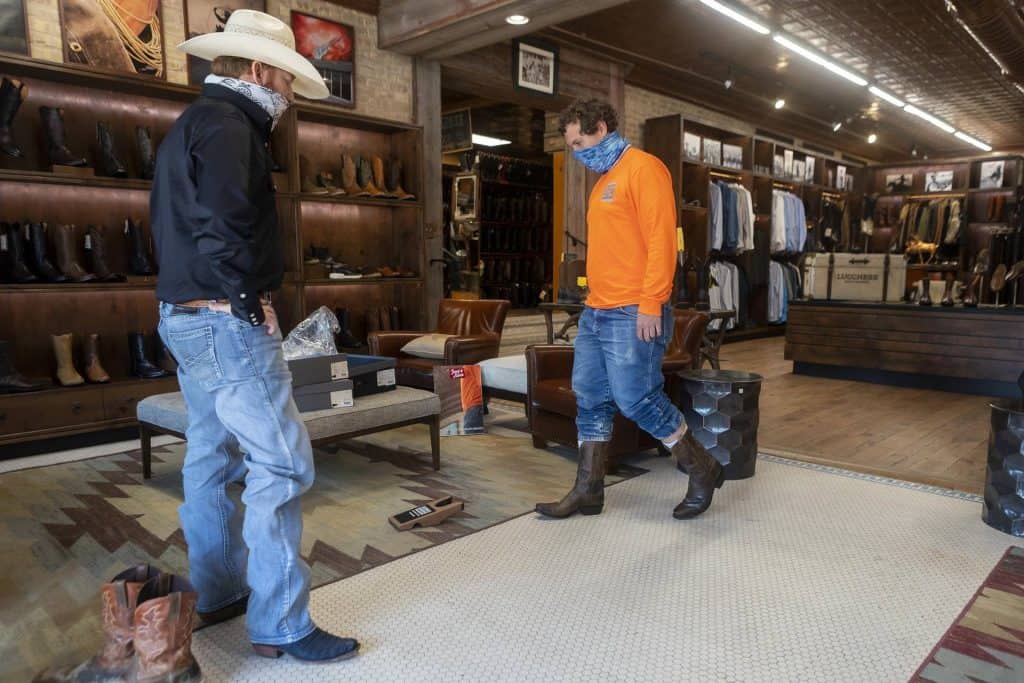
Sales associate Jason Stewart, left, assists customer Randall Bennett at Allens Boots in Austin this week. [Stephen Spillman/for Statesman]
While Texas businesses are slowly starting to reopen and new jobless claims by Texans have declined from their previous record highs, those glimmers of recovery have to be weighed against the long-term economic damage caused by the pandemic, Austin economist Jason Schenker said Thursday.
It could easily be 2022 before the Texas economy returns to its pre-outbreak production level, Schenker said during a virtual event hosted by the Texas Business Leadership Council.
“We probably won’t be back to the level we were at before all of this started until about two years from now. Now, the job market might take four or six years, or even longer than that.”
Jason Schenker, president of Austin-based Prestige Economics
Schenker told members of the business council that he projects the Texas unemployment rate to be about 17% currently. Though he said he expects that number to drop to about 10% by the end of the year, Schenker said a large portion of the state’s workforce will be without jobs.
“That’s still a monstrously big number,” Schenker said.
A total of 134,381 Texans filed new claims for unemployment benefits last week. That was down from the previous week, when there were 141,553 new claims, but remains more than double the number of filings in any week in 2019. In the past two months, slightly more than 2 million Texans have filed jobless claims.
Schenker said the downturn could also be compounded with a second wave of economic impact.
“Not a ‘second wave’ in terms of the coronavirus, but in terms of the economic impact. That could be in the form of a housing crisis that comes in at the back of this. If a bunch of people don’t have jobs, that’s probably going to be a bunch of mortgages that people end up not being able to pay.”
Schenker
Some of the stress on the Texas economy has also come from the pain suffered by the oil and gas industry, which plays a significant role in the state’s economic success, said Dr. Ray Perryman, a Waco-based economist. The price of oil has declined dramatically in the past few months, due in part to a huge drop in demand during the outbreak.
“In Texas, the oil situation is especially significant to the economy. At the beginning of this year, oil prices were trending in the upper $50s per barrel but are now a fraction of that level.”
Dr. Ray Perryman, a Waco-based economist
“Adverse effects on oil-producing areas are being observed in a dramatic fashion, but the fallout from the situation involves all regions of Texas.”
Dr. Perryman
Perryman projected that the decline in oil prices, in combination with other factors, will lead to a $133.8 billion — or about 7.6% — decline in the state’s gross domestic product in 2020. He said the state could also lose about 861,000 jobs by the end of the year.
Perryman projected that it will be several years before the state’s economy is producing at the levels it was at the end of 2019.
“It is expected to take two to five years to return to the level of business activity the state would otherwise have experienced in the absence of COVID-19 and the related measures to prevent a spike in infections.”
Perryman
Gov. Greg Abbott began announcing plans to reopen the Texas economy in April, when he said retail stores and restaurants would be allowed to open under capacity limits starting in early May. Abbott announced Monday that retail stores and restaurants could operate at 50% capacity starting Friday. He said bars, craft breweries and wine tasting rooms will be limited to 25% capacity for inside spaces.
Abbott has put together a task force of government officials and business leaders to address how to best reopen the state’s economy.
Texas House Speaker Dennis Bonnen is a member of that task force. He said he and the other members of the group remain optimistic but are aware that it could take time for the state’s economy to pick back up.
“Our hope is that we can start getting the economy going again now, and that will hopefully reduce the length of the long-term negative impact on the economy.”
Texas House Speaker Dennis Bonnen
Bonnen said economic recovery in the state will only take place if residents do not feel that their health is at risk.
“We’re seeing polling right now that says 70% of Texans aren’t feeling comfortable about getting back into the economy,” Bonnen said. “The sooner we get Texans comfortable and confident in their well-being of being a productive part of the economic process in Texas, the sooner our economy will begin its recovery.”
Speaker Bonnen
How quickly the Texas economy bounces back could ultimately depend on consumers’ ability — and willingness — to go out and spend money, Schenker said.
“Consumption is 70% of our economy. Well, people are kind of scared,” Schenker said. “If people are spending less money, that’s less economic activity and less economic buildup.”
Speaker Bonnen


